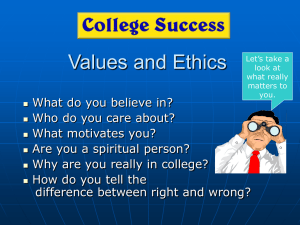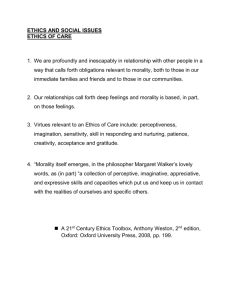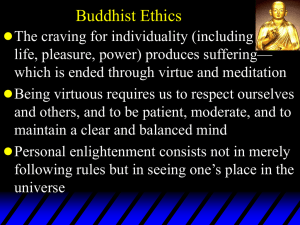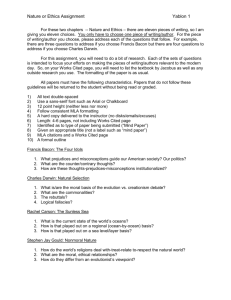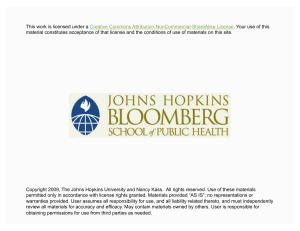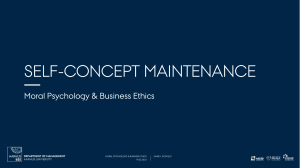Values and Ethics
advertisement
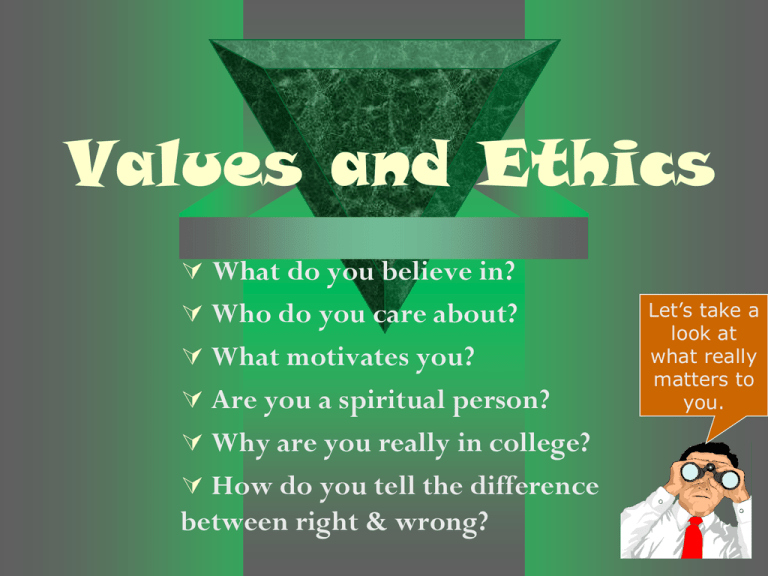
Values and Ethics What do you believe in? Who do you care about? What motivates you? Are you a spiritual person? Why are you really in college? How do you tell the difference between right & wrong? Let’s take a look at what really matters to you. What are values? They are the ideas and beliefs about life that guide us to do what we do and be what we are… They can be about: Politics Sex Religion Being of service Education Money Career Family Friends Dishonesty Taking Risks Respect Leisure And so on… Different kinds of Values Moral Values: – Values you hold for yourself but don’t force on others such as right vs. wrong, honesty vs. dishonesty, being of service to others Aesthetic Values: – Personal standards of beauty as seen in nature, art, music, personal appearance Performance Values: – Benchmarks you set for yourself such as accuracy, speed, reward for achievement, self-discipline and overall accomplishment Means & Ends Values Instrumental Values (the means): – Objectives used to reach goals such as being responsible, obedient, loving, ambitious, independent, honest Intrinsic Values (the end): – Personal happiness, a comfortable life, personal freedom, true friendship, a successful career Forging Academic Values: Participate Honorably #1 Let’s be frank: If you cheat or plagiarize, you are side-stepping the real reason you came to college: to get an education. Academic dishonesty myths: – The risk of getting caught is small. • It only takes getting caught once and you could be out. – There is no other way to be “successful.” • No? Then dishonesty should be the hallmark of all human endeavor. – It doesn’t matter in the long run. • Not if you don’t have a conscience. – The penalty for getting caught won’t be severe. • Is this something you want to find out the hard way? Forging Academic Values: Participate Honorably #2 If, on the other hand, you honestly give it your “best shot”: – Practicing academic integrity builds moral character. • There’s nothing like having your conscience tell you did it right! – Choosing moral actions builds others’ trust in you. • Having people believe in you is a major plus. – Making bogus grades masks real feedback about learning. • How will you ever know what you are really capable of? – Improving integrity in the classroom can rebuild national character. • The college classroom is an excellent place to begin stemming the tide of corporate greed and corruption. Challenges to your Values At college, you are going to meet new people whose values may be quite different, if not totally opposite, to your own. – You may be politically liberal and find yourself befriending a staunch conservative. Are you going to pass judgment and walk away? Or are you going to be tolerant and try to see the person in a new way? Tolerance is a very positive trait, but even it can be carried too far. If you see your new friend show a really self-destructive tendency, like excessive drinking, it is probably best not to aid and abet them in their weakness, but rather to tell them what you really think. Your challenge is to balance your personal welfare, your tolerance for diversity and your freedom of choice. Changing Society, Changing Values American values are changing, caused by: – Demographic changes caused by much immigration from other countries – Globalization of the world economy – Growing environmental concerns – Political polarization – Breakup of the family – Computer technology and the Internet – The Feminist movement – Federal intervention in state’s rights – Terrorism – And on and on… All of these, and many more, will greatly affect the values of the individual. Values & Ethics In the preceding presentation about values, the words morals and morality came up regularly. Is there a connection between morality and ethics? Generally, the words are used interchangeably. There is, however, a difference: – Morality is usually more theoretical; it is a philosophical concept. – Ethics are the practical application of morality in daily life. The difference is that of theory and practice. If a person has a moral character, he or she will generally deal with other people in an ethical manner.
